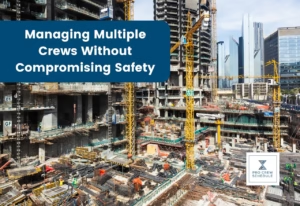In a highly competitive industry like construction, having proper certifications before one gets to work is not a want but a need. These construction certifications can make you more credible as an individual and can help you land a better job. Consequently, having construction staff in the manpower can make any company appear more trustworthy to clients, improve your job site safety, and help your staff complete jobs efficiently, reducing time spent on an activity and increasing quality. Certification and training programs can cover various aspects of construction practices, from project management to reducing hazards on job sites.
No matter your role in construction, you can receive a lot of value from construction certifications. Stay competitive and hone your professional skills by getting certified. Here are the best construction certifications that you might consider to prepare you to take on any situation.
What is a Construction Certification?
Generally speaking, a construction certification is a designation or document that shows your mastery or competency in a specific role.
The common path to certification involves applicants completing a predetermined number of hours of coursework, taking a certification exam, and paying an application fee. Once you’re certified, you become a more valuable asset to your current and prospective employers.
In a nutshell, construction certifications are offered by private companies, governmental agencies, or trade organizations with expertise in the construction industry. Some certifications usually have some prerequisites that applicants must fulfill, such as education or work experience, and the coursework can vary from two hours to 1,000 hours, depending on the certification. Some courses are available entirely online, while some require in-person training.
Are Construction Certificates Valuable in the Long Run?
It’s relevant to question whether construction certificates are valuable in the long run, as they take time and resources, considering that very few are free. However, there are several reasons why certification is worth pursuing, particularly the ones we’ll feature below.
Make your job more efficient
To earn a construction certification, you need to show proficiency in a particular area of the industry, which means you’ll have to study and learn. This learning experience allows you to grow your knowledge as you familiarize yourself with more in-depth aspects of the specialty, such as construction crew scheduling, safety standards, sustainability, and more. Ultimately, you can rely on these learnings when faced with challenges or inefficiencies in your work, making your job easier.
Build a stronger professional profile
The more knowledge and experience you have professionally, the better you’ll be at making decisions that affect the company you’re part of. And, with a company culture that values certifications, your fellow employees and executives will also strive to learn more. Additionally, the sheer variety and volume of certificates available means you can begin to specialize in areas that interest you, leading to better career satisfaction.
From another perspective, certifications can help you attract recruiters and open up to better job opportunities. Should a company be looking for an individual with project management experience, a PMP may help you stand out from the crowd.
Foster career growth
By pursuing specific construction certificates, employees can specialize in the industry’s areas that interest them the most. This professional development might make them eligible for certain positions or departments within an organization, leading to better job satisfaction.
Better compensation package
If you’re still considering whether construction certificates are worth it, this advantage can prove it. People with certain certifications can make significantly more than those without. Few estimates for PMP holders alone reveal that they earn more than 20% more than construction managers and project managers without certificates.
Beyond that actual hike in salary you might expect from certification, you will also become more marketable, giving you more leverage when interviewing with possible employers.
What are the Essential Construction Certifications in the Market?
Project Management Professional (PMP)
In the construction project manager sphere, the Project Management Professional certification is a favored credential. It provides employers with assurance that candidates can effectively manage construction projects and have a strong knowledge of technical skills and soft skills that can leverage their work on a construction site. This certification also shows employers that an individual is well-versed in construction crew scheduling, planning, budgeting, and project management in general.
One can earn a Project Management Professional certification by showing evidence of professional experience, completing the application process, paying a fee, and passing the PMP certification exam. You can maintain your PMP certification by completing a specific number of professional development hours every three years.
LEED Green Associate
The LEED Green Associate certification concentrates on environmentally sustainable construction practices. This certification tells prospective employers that candidates understand several green construction concepts and how to apply them during jobs in the field. LEED certificate also shows your proficiency in managing material schedules in construction and is knowledge about different green-friendly building material substitutes that you can utilize in different construction projects.
Candidates can earn the sought-after LEED Green Associate certification from Green Business Certification Inc. (GBCI), which offers more specialized certifications for which candidates can apply. Acquiring the LEED Green Associate certification involves:
- Studying the resources provided by GBCI.
- Taking a LEED certification exam.
- Paying an application fee.
LEED Green Associates can renew their certification by undergoing at least 15 hours of continuing education every two years.
Certified Construction Manager (CCM)
The Certified Construction Manager (CCM) certification recognizes qualified construction managers as experts in their field. Individuals can earn CCM certification from the Construction Manager Certification Institute (CMCI), which is part of the Construction Management Association of America (CMAA).
To qualify for the CCM certification, one is required to have at least four years of leadership experience in skills listed by the CMAA, eight years of previous experience in construction or design, and two client references. The CCM certification is required to be renewed every three years by completing required training activities, passing the CCM exam, and paying a recertification fee.
Certified Professional Constructor (CPC)
The Certified Professional Constructor certification continues the CAC certification that gives candidates a more advanced credential. Most candidates earn the CAC certification before pursuing the CPC certification, but you can also apply directly for the CPC certification if you have at least eight years of construction experience with two years of experience in a management position.
The CPC certification recognizes that candidates possess an in-depth understanding of procedures and ethics in the construction industry, as well as developed leadership skills. To earn this certification, you must pass the CPC exam and pay the certification fee.
Certified Associate Constructor (CAC)
The Certified Associate Constructor certification (formerly known as the Associate Constructor certification) is a general certification for industry professionals and managers. This certification shows a professional’s advanced training in several areas of construction and can exemplify the skills that make them experts in the field.
American Institute of Constructors (AIC) offers different options to earn this certification to qualified candidates with at least a four-year degree in construction management or four years of previous construction experience. To get the CAC certification, candidates can apply through the AIC and take an exam upon approval.
Occupational Safety and Health Administration (OSHA) certifications
One of the most popular certifications in the construction industry, the Occupational Safety and Health Administration (OSHA) offers a number of options for training programs in safety for construction professionals. The programs that OSHA offers are not considered official certifications. Still, they function to the same degree by providing candidates with credentials they can provide to potential employers to verify their specialization in this field.
OSHA’s courses usually promote safety by combining hands-on training with online coursework opportunities. According to OSHA’s official website, these include 10-—or 30-hour programs in workplace ethics and hazards and 8- to 40-hour Hazardous Waste Operations and Emergency Response (HAZWOPER) courses.
Certified Safety Manager (CSM)
If you’re looking to advance to a job as a safety manager or in a related position, the Certified Safety Manager certification can bring the most benefit to you. The National Association of Safety Professionals (NASP) offers this certification for higher-level safety managers. Construction professionals pursue the CSM certification to validate their credentials as qualified leaders in safety principles and practices on a job site and highlight their ability to lead a team and work independently.
To qualify for the CSM certification, you’ll need a bachelor’s degree in occupational health and safety and at least five years of experience in a job in the same field of expertise. Acquiring the certification involves undergoing a training course, paying a certain fee, and passing the CSM exam.
Residential Concrete Foundation Technician
Provided by the American Concrete Institute (ACI), the Residential Concrete Foundation Technician certification offers training for those in the construction field who specialize in the concrete trade in the construction of residential projects. This certification guarantees a candidate’s knowledge of general building codes, concrete placement, properties, and troubleshooting during a concrete project. Candidates can receive this certification by paying a fee and passing the RCFT exam.
Key Takeaway
The construction industry is filled with brilliant and hardworking people, and certifications are now essential to show your competencies and passion in your field of specialization. Investing your time and money in your professional endeavors is never a waste of resources, as you also invest in yourself. Grow as a professional as the industry continues to transform, and you’ll remain at the forefront of success.
One of the credentials you can provide to your current and prospective employers is proficiency in using construction crew management software. You must be proficient in advanced tools in the industry if you want to advance your career.
With your certifications combined with construction management software mastery, you have a double edge against other professionals. Pro Crew Schedule, a leading construction crew management software in the industry, is a tool you can utilize with only general industry knowledge. With its simple interface and advanced features, you will master this innovative tool in no time. Moreover, it’s under free trial for 30 days.







